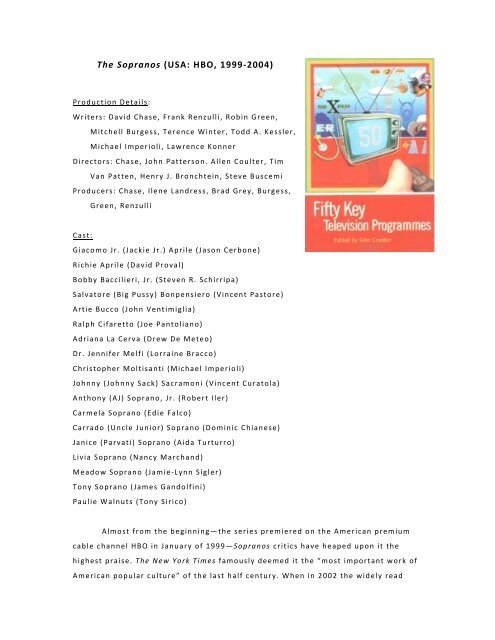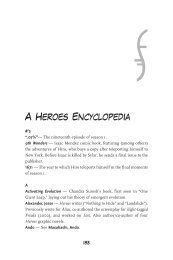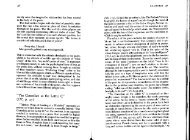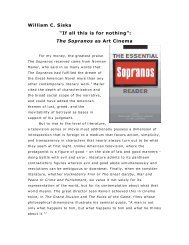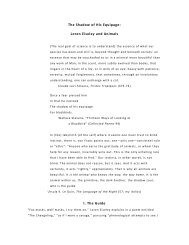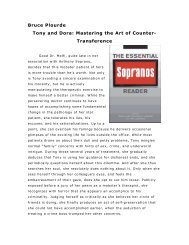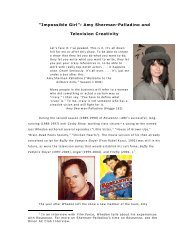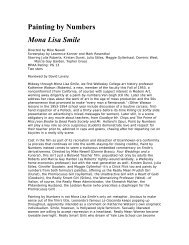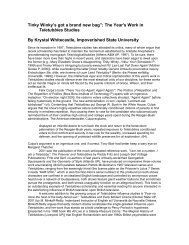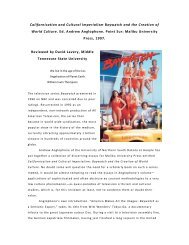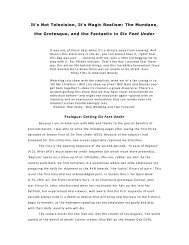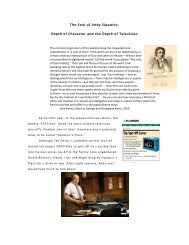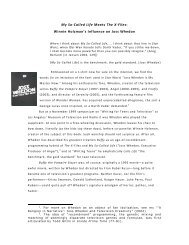The Sopranos (USA: HBO, 1999‐2004) - David Lavery
The Sopranos (USA: HBO, 1999‐2004) - David Lavery
The Sopranos (USA: HBO, 1999‐2004) - David Lavery
Create successful ePaper yourself
Turn your PDF publications into a flip-book with our unique Google optimized e-Paper software.
<br />
<br />
<strong>The</strong> <strong>Sopranos</strong> (<strong>USA</strong>: <strong>HBO</strong>, <strong>1999‐2004</strong>) <br />
Production Details: <br />
Writers: <strong>David</strong> Chase, Frank Renzulli, Robin Green, <br />
Mitchell Burgess, Terence Winter, Todd A. Kessler, <br />
Michael Imperioli, Lawrence Konner <br />
Directors: Chase, John Patterson. Allen Coulter, Tim <br />
Van Patten, Henry J. Bronchtein, Steve Buscemi <br />
Producers: Chase, Ilene Landress, Brad Grey, Burgess, <br />
Cast: <br />
Green, Renzulli <br />
Giacomo Jr. (Jackie Jr.) Aprile (Jason Cerbone) <br />
Richie Aprile (<strong>David</strong> Proval) <br />
Bobby Baccilieri, Jr. (Steven R. Schirripa) <br />
Salvatore (Big Pussy) Bonpensiero (Vincent Pastore) <br />
Artie Bucco (John Ventimiglia) <br />
Ralph Cifaretto (Joe Pantoliano) <br />
Adriana La Cerva (Drew De Meteo) <br />
Dr. Jennifer Melfi (Lorraine Bracco) <br />
Christopher Moltisanti (Michael Imperioli) <br />
Johnny (Johnny Sack) Sacramoni (Vincent Curatola) <br />
Anthony (AJ) Soprano, Jr. (Robert Iler) <br />
Carmela Soprano (Edie Falco) <br />
Carrado (Uncle Junior) Soprano (Dominic Chianese) <br />
Janice (Parvati) Soprano (Aida Turturro) <br />
Livia Soprano (Nancy Marchand) <br />
Meadow Soprano (Jamie‐Lynn Sigler) <br />
Tony Soprano (James Gandolfini) <br />
Paulie Walnuts (Tony Sirico) <br />
<br />
Almost from the beginning—the series premiered on the American premium <br />
cable channel <strong>HBO</strong> in January of 1999—<strong>Sopranos</strong> critics have heaped upon it the <br />
highest praise. <strong>The</strong> New York Times famously deemed it the “most important work of <br />
American popular culture” of the last half century. When in 2002 the widely read
<strong>The</strong> Collected Works of <strong>David</strong> <strong>Lavery</strong> 2<br />
periodical TV Guide published its list of the fifty greatest shows of all time, <strong>The</strong> <br />
<strong>Sopranos</strong> only held fifth place but was the highest ranked dramatic series in <br />
television history. Ellen Willis deemed it “<strong>The</strong> richest and most compelling piece of <br />
television—no, of popular culture—that I've encountered in the past twenty years . . <br />
. a meditation on the nature of morality, the possibility of redemption, and the <br />
legacy of Freud.’ <strong>The</strong> subtitle of Canadian Maurice Yacowar’s recent book—<strong>The</strong> <br />
<strong>Sopranos</strong> on the Couch: Analyzing Television’s Greatest Series—simply assumes its <br />
preeminence. TV critic Matt Roush proclaims the series the “greatest mob drama <br />
ever,” ranking it ahead of even Francis Ford Coppola’s Godfather Trilogy. <br />
Of course the verdict was not unanimous. Prominent critics like Wolcott (who <br />
had originally praised the series) and Paglia loudly voiced their loathing of it. Italian‐<br />
American groups denounced the show for what they believed to be its offensive, <br />
grossly stereotyped depiction of Italians as mobsters, mounting letter‐writing <br />
campaigns, staging boycotts, harassing <strong>Sopranos</strong> cast and crew in their public <br />
appearances, and even seeking legislative action against the series. Some critics <br />
(Lauzen, for example) were appalled by what they saw as misogynist tendencies in <br />
Season Three (the rape of Dr. Melfi, the brutal murder of a pregnant stripper, the <br />
near suicide‐by‐mobster of Tony’s mistress Gloria Trillo). When broadcast <br />
uncensored in Canada on CTV, the national Broadcast Standards Council, charged by <br />
law with preventing dissemination of “any abusive comment or abusive pictorial <br />
representation that, when taken in context, tends or is likely to expose an individual <br />
or group or class of individuals to hatred or contempt on the basis of race, national <br />
or ethnic origin, colour, religion, sex, age or mental or physical disability” was asked <br />
to take action against the series and CTV. <strong>The</strong> Council’s review of <strong>The</strong> <strong>Sopranos</strong>, <br />
however, found the complaints without merit (see Johnson). <br />
At the turn of the century, <strong>The</strong> <strong>Sopranos</strong> became a powerful cultural <br />
phenomenon, generating prolific water‐cooler conversation, endless print and <br />
electronic media news stories, magazine covers, and commodity intertexts, including <br />
Allen Rucker’s official <strong>The</strong> <strong>Sopranos</strong> Family History and <strong>The</strong> <strong>Sopranos</strong> Family <br />
Cookbook and a selection of scripts from the first three seasons. At the time of this <br />
writing (Fall 2002) a line of <strong>Sopranos</strong> frozen food is about to hit the market. <br />
In promotions for the series, <strong>HBO</strong> has used the tag lines “Family, redefined,” <br />
and “One family or the other will kill him [Tony Soprano].” <strong>The</strong> continuing narrative <br />
of <strong>The</strong> <strong>Sopranos</strong> moves back and forth between the suburban nouveau riche and <br />
mafia families of a New Jersey crime boss. On the home front, we find Carmela,
<strong>The</strong> Collected Works of <strong>David</strong> <strong>Lavery</strong> 3<br />
Tony’s long‐suffering, morally compromised, but very tough wife; Meadow, his <br />
daughter, now a student at Columbia University, who knows very well that her father <br />
is not really in the waste management business; Anthony Junior, his bad boy son; his <br />
New Age shlub of a sister, the scheming, but now born‐again Christian Janice; Uncle <br />
“Junior,” Corrado Soprano, an elderly, easily manipulated Mafioso; and his (now <br />
deceased) passive‐aggressive monster of a mother, Livia, who coerces Uncle Junior <br />
into ordering a failed hit on Tony, retaliation for putting her in a luxurious <br />
retirement home. At the “office”—Tony and his crew use <strong>The</strong> Bada Bing, a local strip <br />
club, as their primary headquarters, although they also convene in the back of <br />
Satriale’s Pork Store—the regulars include Silvio Dante, manager of the Bing and <br />
Tony’s loyal captain; Paulie Walnuts, an anal‐compulsive hit man; and Christopher <br />
Moltisanti, Tony’s impulsive nephew, a young made‐man who aspires to write mob <br />
dramas for Hollywood. Tony’s worlds collide, however, in the office of Dr. Jennifer <br />
Melfi, where he seeks help for panic attacks. A mob boss in a psychiatrist’s office <br />
was, in fact, the seed crystal for the series, and Melfi becomes an all‐purpose ficelle, <br />
interpreting Tony’s conscious and unconscious life. <br />
In “46 Long,” in what must be taken as a television auteur’s signature, <br />
<strong>Sopranos</strong> creator <strong>David</strong> Chase has one a minor character quote the old Italian saying <br />
“col tempo la foglia, di gelso divena seta”/time and patience change the mulberry <br />
leaf to silk. A veteran of twenty seven years as a writer, producer, and occasional <br />
director of network television (he had previously contributed to such series as <strong>The</strong> <br />
Rockford Files [1976‐80] and Northern Exposure [1993‐95]), Chase has long been an <br />
outspoken critic of network television. As <strong>Lavery</strong> and Thompson have shown, that the <br />
silk of <strong>The</strong> <strong>Sopranos</strong> as we know it ever came to be produced was the result of an <br />
against‐all odds fortuitous set of circumstances coupled with many adept artistic <br />
choices. If <strong>The</strong> <strong>Sopranos</strong> turns out to be as revolutionary a television series as it now <br />
appears to be, Chase may have succeeded in transforming a medium through his <br />
loathing of it. <br />
Faced with the challenge of doing a mob story on television, Chase <br />
understood immediately (as he tells Bogdanovich) that he would have to redirect the <br />
genre “into the family.” <strong>The</strong> series’ mobsters are all fans of the gangster film genre—<br />
Silvio endlessly quotes Michael Corleone (Al Pacino) from <strong>The</strong> Godfather films, <br />
Christopher tries his hand at writing an (illiterate) gangster film screenplay, Tony <br />
cries while viewing Public Enemy, moved to tears by the film’s loving mother, so <br />
different from his own—and <strong>The</strong> <strong>Sopranos</strong> is, not surprisingly, intertextual to the
<strong>The</strong> Collected Works of <strong>David</strong> <strong>Lavery</strong> 4<br />
core, playing off of predecessor texts in the genre. Indeed, it is possible to map most <br />
of the narrative according to the gangster film coordinates outlined by Robert <br />
Warshow forty years years ago (see Auster, Pattie, Remnick). <br />
But <strong>The</strong> <strong>Sopranos</strong> operates on a new, smaller scale in a different medium. <br />
Creeber has argued that the series “implicitly critiques the ‘televisionization’ of the <br />
gangster genre—parodying its gradual development (Chase might say decline) from <br />
cinematic epic to standard video or television fare . . . its constant self‐reflexive <br />
referencing to its own generic history reveal[ing] a television narrative desperately <br />
trying to re‐invent and re‐examine itself.” And Donatelli and Alward insist that it is <br />
possible to view <strong>The</strong> <strong>Sopranos</strong> as “a kind of feminist metatext” in which “Tony and <br />
his mob friends are ‘framed’ by rules of domestic television . . . all their actions . . . <br />
constantly subject to forms of irony and comedy that by now have become inevitably <br />
identified with serialized programming. While Tony and his friends may think they’re <br />
tough, everything that they do is undercut because they are cast in soap‐opera <br />
episodes that deny them the dignity of a full‐length Mafia movie, let alone a trilogy.” <br />
<strong>The</strong> <strong>Sopranos</strong> has likewise departed from many of the conventions of <br />
television drama. Its casting, especially of the balding and overweight James <br />
Gandolfini as Tony, was a departure from television norms, as were the characters <br />
they portrayed, capable of extreme violence and despicable behavior. Nor did its <br />
narrative style conform to traditional multi‐season dramas. Though fans expected <br />
some variation on the “Who shot J. R?” cliffhanger at the end of Season One, Chase <br />
and company offered none, nor has the series exhibited any sense of urgency about <br />
resolving some of its many arcs. Instead, Chase has repeatedly stated his desire to <br />
make self‐contained one hour movies: “Sometimes I feel like we need to take a <br />
vacation from all that continuing stuff,” Chase explains in an interview, “It’s just so <br />
TV” (Handleman). In the introduction to the <strong>Sopranos</strong> scripts, he articulates his hope <br />
that his series is “similar to the foreign films I loved as a young adult for their ideas, <br />
their mystery, and their ambiguity—for not having the endings spelled out or telling <br />
the audience what to think or feel.” <strong>The</strong> series’ peerless use of music “as another <br />
character, the lyrics of songs functioning as a Greek chorus” (as Chase explains it) is <br />
likewise distinctive. <br />
In order to produce his thirteen‐episodes‐a‐year mini‐movies, Chase has also <br />
demanded more and more time between seasons of <strong>The</strong> <strong>Sopranos</strong>—time devoted to <br />
fine‐tuning the writing (each script goes through as many as ten drafts) and planning <br />
for the on‐location (in New Jersey) cinematic‐style filming. (<strong>The</strong> <strong>Sopranos</strong> has a rich
<strong>The</strong> Collected Works of <strong>David</strong> <strong>Lavery</strong> 5<br />
textual geography which, not surprisingly, has invited the attention of media <br />
ecologists [see Strate].) <strong>The</strong> hiatus between the third and fourth years lasted <br />
sixteenth months. Nor has Chase been willing to agree to an indefinite run for the <br />
series. Although <strong>The</strong> <strong>Sopranos</strong> is now committed to a five year run, Chase is <br />
absolutely determined to then pull the plug on his creation. <br />
Although the major American television networks, all of which passed on the <br />
show, have attributed the tremendous success of <strong>The</strong> <strong>Sopranos</strong> to <strong>HBO</strong>’s cable TV <br />
freedom to air nudity and profanity, Chase finds that explanation superficial. It is not <br />
bare breasts and obscenities that have set <strong>The</strong> <strong>Sopranos</strong> apart but, according to its <br />
creator, a variety of other factors: the narrative possibilities granted by the absence <br />
of commercial interruption, the freedom to allow characters to develop slowly over <br />
time, the series’ insistence on treating its audience as highly intelligent. As <br />
Poniewozik observes, <strong>The</strong> <strong>Sopranos</strong> expects its viewers to remember details from <br />
three years back in an era in which the broadcast networks “increasingly believe it's <br />
highfalutin to air dramas like 24 that require viewers to remember what happened <br />
the week before.” <br />
<strong>The</strong> <strong>Sopranos</strong> also assumes that its audience shares its often wicked sense of <br />
humor. In several interviews Chase has proclaimed his credo that humor should <br />
accrue naturally out of the dramatic material and not be imposed upon it, a doctrine <br />
to which the series, full of pratfalls, scatology, puns, malapropisms, funny names, <br />
clever allusions (in This Thing of Ours <strong>Lavery</strong> provides a nineteen page partial catalog <br />
of <strong>Sopranos</strong> references) is not always faithful. <strong>The</strong> <strong>Sopranos</strong> is one of the funniest <br />
shows on television, however, because it partakes in the great tradition of comedy: <br />
its characters are consistently hilarious because they are often clueless, devoid of <br />
any insight into themselves, any wisdom about their predicaments. <br />
<strong>The</strong> series is an excellent example of a Bakhtinian dialogical text, like a great <br />
novel (perhaps one by Bakhtin’s much admired Dostoevsky—who puts in an <br />
appearance in <strong>The</strong> <strong>Sopranos</strong> when a psychiatrist suggests that Tony should read <br />
Crime and Punishment in his prison cell). It refuses to judge its characters or espouse <br />
a single point of view, a single authorial stance. As Chase insists, “we do not have <br />
signposts that tell the viewer how to feel. This is sad, this is good, this is scary, you <br />
should laugh at this” (Handelman). <br />
Not governed by the same Nielsen ratings criteria as broadcast <br />
programming—for years, <strong>HBO</strong>’s most famous tag line has proclaimed “It’s not TV. It’s <br />
<strong>HBO</strong>”—<strong>The</strong> <strong>Sopranos</strong> has nevertheless garnered the largest audiences in the history
<strong>The</strong> Collected Works of <strong>David</strong> <strong>Lavery</strong> 6<br />
of cable. Although only about a third of American homes even receive <strong>HBO</strong>, the <br />
premiere of the second season drew 11 million viewers. A product of TV III, a period <br />
in broadcast history, beginning in roughly 1995, dominated by cable television and <br />
the rise of digital programming, <strong>The</strong> <strong>Sopranos</strong> stands as a “nuts and bolts triumph of <br />
non‐network TV” and as the show that established once and for all the <strong>HBO</strong> brand <br />
with the viewing public (Rodgers, Epstein, and Reeves; Levinson). While television <br />
executives in the United States are now in the process of rediscovering the Least <br />
Objectionable Programming theory and building their schedules on its foundation, <br />
<strong>The</strong> <strong>Sopranos</strong> has demonstrated (in the words of Poniewozik) something quite <br />
different: “Not only will ordinary folks watch a show that demands constant <br />
attention, resists easy closure, relies on subtext and is rich with metaphor—they will <br />
pay near usurious subscription fees for it.” <br />
<br />
Questions to Consider: <br />
• Why have Italian‐American defamation groups found <strong>The</strong> <strong>Sopranos</strong> so offensive? <br />
• How do women in the series differ from their counterparts in classic gangster <br />
films? <br />
• What features of cable television have contributed to the economic success of <strong>The</strong> <br />
<strong>Sopranos</strong>? <br />
• What features of cable television have contributed to its artistic success? <br />
• Buffy is a series highly dependent upon cultural and pop cultural references in <br />
establishing its humor and its meanings. Can you give some examples? <br />
• How does music function in <strong>The</strong> <strong>Sopranos</strong>? <br />
• Psychoanalysis plays a prominent role in every episode. What contribution does it <br />
<br />
make to the series’ narrative? <br />
Recommended Readings <br />
<strong>Lavery</strong>, <strong>David</strong>, ed. (2002). This Thing of Ours: Investigating <strong>The</strong> <strong>Sopranos</strong>. New York: <br />
Columbia UP. <br />
Rucker, Allen (2001). <strong>The</strong> <strong>Sopranos</strong>: A Family History. New York: New American <br />
Library. <br />
Yacowar, Maurice (2002). <strong>The</strong> <strong>Sopranos</strong> on the Couch: Analyzing Television’s Greatest <br />
<br />
Series. New York: Continuum. <br />
Full List of References
<strong>The</strong> Collected Works of <strong>David</strong> <strong>Lavery</strong> 7<br />
“Peter Bogdanovich Interviews <strong>David</strong> Chase.” <strong>The</strong> <strong>Sopranos</strong>: <strong>The</strong> Complete First <br />
Season. DVD. NY: <strong>HBO</strong>‐Time‐Warner Prod., 2000. <br />
Chase, <strong>David</strong>. “Introduction.” <strong>The</strong> <strong>Sopranos</strong>: Selected Scripts from Three Seasons. <br />
New York: Warner Books, 2002: vii‐x. <br />
Creeber, Glen. “’TV Ruined the Movies': Television, Tarantino, and <strong>The</strong> Intimate <br />
World of <strong>The</strong> <strong>Sopranos</strong>.” This Thing of Ours: 124‐134. <br />
Croft, Karen. “Made Women. <strong>The</strong> <strong>Sopranos</strong> Deals with Female Emotional and Sexual <br />
Desire Better than Any Other Show on TV.” <br />
http://www.salon.com/sex/feature/2001/04/09/mob_women/index.html. <br />
Donatelli, Cindy and Sharon Alward. “’I dread you”?: Married to the Mob in <strong>The</strong> <br />
Godfather, Goodfellas, and <strong>The</strong> <strong>Sopranos</strong>.” This Thing of Ours: 58‐69. <br />
Handelman, <strong>David</strong>. “<strong>The</strong> Wisest Guy.” <strong>Sopranos</strong> Companion: 7‐11. <br />
Johnston, Dawn Elizabeth B. “Way North of New Jersey: A Canadian Experience of <strong>The</strong> <br />
<strong>Sopranos</strong>.” This Thing of Ours: 32‐41. <br />
Lauzen, Martha. “Don’t Forget the Brutalized Women behind <strong>The</strong> <strong>Sopranos</strong>.” Los <br />
Angeles Times (April 16, 2001). <br />
http://www.sicilianculture.com/news/sopranoswomen.htm. <br />
<strong>Lavery</strong>, <strong>David</strong> and Robert J. Thompson. “<strong>David</strong> Chase, <strong>The</strong> <strong>Sopranos</strong>, and Television <br />
Creativity.” This Thing of Ours: 18‐25. <br />
<strong>Lavery</strong>, <strong>David</strong>. “Coming Heavy: <strong>The</strong> Significance of <strong>The</strong> <strong>Sopranos</strong>.” This Thing of Ours: <br />
xi‐xviii <br />
Levinson, Paul. “Naked Bodies, Three Showings a Week, and No Commercials: <strong>The</strong> <br />
<strong>Sopranos</strong> as a Nuts‐and‐Bolts Triumph of Non‐Network TV.” This Thing of <br />
Ours: 26‐31. <br />
<strong>The</strong> New York Times on <strong>The</strong> <strong>Sopranos</strong>, New York: ibooks, 2000. <br />
Paglia, Camille. "<strong>The</strong> Energy Mess and Fascist Fays." Salon, May 23, 2001. <br />
http://www.salon.com/people/col/pagl/2001/05/23/oil/index2.html. <br />
Pattie, <strong>David</strong>. “Mobbed Up: <strong>The</strong> <strong>Sopranos</strong> and the Intertextual Gangster.” This Thing <br />
of Ours: 135‐45. <br />
Poniewozik, James. “Back in Business: Next Month <strong>The</strong> <strong>Sopranos</strong> Gives Some Bada‐<br />
Bing to a Too Safe Fall TV Season.” Time 2 Sept 2002: 56‐57. <br />
Remnick, <strong>David</strong>, “Is this the End of RICO? With <strong>The</strong> <strong>Sopranos</strong> the Mob Genre is on the <br />
Brink.” New Yorker 2 April 2001: 38‐44.
<strong>The</strong> Collected Works of <strong>David</strong> <strong>Lavery</strong> 8<br />
Rogers, Marc C., Michael Epstein, and Jimmie Reeves. “<strong>The</strong> <strong>Sopranos</strong> as <strong>HBO</strong> Brand <br />
Equity: <strong>The</strong> Art of Commerce in the Age of Digital Reproduction.” This Thing of <br />
Ours: 42‐57. <br />
Roush, Matt. “Salute: Why <strong>HBO</strong>’s Series is the Greatest Mob Drama Ever.” <strong>Sopranos</strong> <br />
Companion: 4‐5. <br />
Rucker, Allen. <strong>The</strong> <strong>Sopranos</strong>: A Family History. New York: New American Library, <br />
2000. An expanded edition, covering all three seasons, was published in 2001. <br />
___. <strong>The</strong> <strong>Sopranos</strong> Cookbook. New York: Warner, 2002. <br />
<strong>Sopranos</strong> Companion. Radnor, PA: TV Guide, 2002. <br />
Strate, Lance. “No(rth Jersey) Sense of Place: <strong>The</strong> Cultural Geography (and Media <br />
Ecology) of <strong>The</strong> <strong>Sopranos</strong>.” This Thing of Ours: 178‐91. <br />
Warshow, Robert, “<strong>The</strong> Gangster as Tragic Hero.” <strong>The</strong> Immediate Experience: 127‐<br />
133. <br />
___. "Movie Chronicle: <strong>The</strong> Westerner.” <strong>The</strong> Immediate Experience: 135‐54. <br />
___. <strong>The</strong> Immediate Experience: Movies, Comics, <strong>The</strong>atre and Other Aspects of <br />
Popular Culture. New York: Doubleday and Co. Inc, 1962. <br />
Willis, Ellen. ‘Our Mobsters, Ourselves.” This Thing of Ours: 2‐9. Originally published <br />
in <strong>The</strong> Nation 2 April 2001. <br />
Wolcott, James. “<strong>HBO</strong>’s Singular Sensation.” Vanity Fair February 2000: 24‐27.


